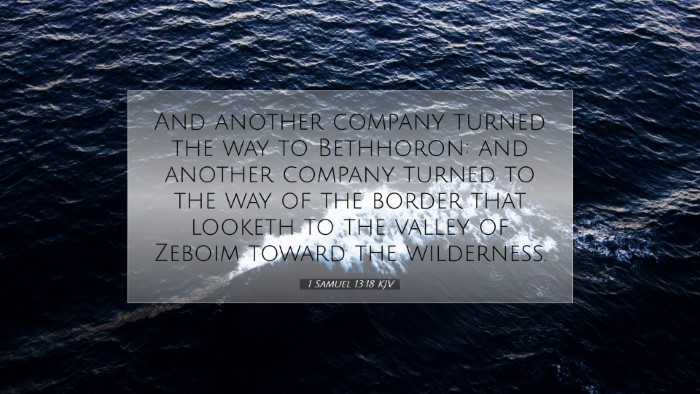Commentary on 1 Samuel 13:18
Verse: 1 Samuel 13:18 states, "And another company turned the way to Beth-Horon: and another company turned to the way of the border that looketh to the valley of Zeboim toward the wilderness."
Historical Context
This verse must be understood in the broader historical context of the Israelites' battles against the Philistines. At this point in history, the Israelites were struggling for survival against a formidable enemy. King Saul, having been anointed by Samuel, was tested in his leadership during this critical juncture. Public domain commentaries elucidate that the Philistines were a constant threat, requiring strategic military responses from Israel.
Military Strategy in Scripture
The movements indicated in verse 18 reflect tactical decisions made by Saul’s forces. The mention of different companies suggests a well-coordinated military strategy. Albert Barnes notes that this division into companies indicated a multiple-pronged strategy, aimed at confusing or dividing the enemy's focus. The actions of these companies represent an early military doctrine observed in the biblical narrative: the importance of strategy and unity in conflict.
Understanding the Locations
- Beth-Horon: An important location in the Judean hill country that guarded access routes. Barnes emphasizes that Beth-Horon was strategically significant due to its elevation and the roads leading to it.
- Valley of Zeboim: This location often symbolizes low points or valleys in biblical narratives, both literally and figuratively. Clarke draws attention to the spiritual implications of valleys representing times of trial and hardship.
Spiritual Insights
From a theological perspective, the movements of these companies carry spiritual symbolism. Matthew Henry emphasizes that the initiatives taken in verse 18 can serve as a metaphor for the Christian's journey through life. Just as the Israelites faced external enemies, believers encounter various trials and tribulations. The intentional division of forces can remind us of the necessity of being prepared and vigilant in our spiritual lives.
Application for Today’s Believers
- Preparedness: The importance of readiness against adversities is a recurrent theme in scripture. This passage illustrates physical and spiritual preparedness.
- Unity and Strategy: The different companies signify the need for effective teamwork and unity within the Body of Christ, which is essential for overcoming challenges.
- Trust in God: As Saul faced potential defeat, this text invites believers to put faith in God’s sovereignty even amid adversity.
Theological Reflection
In their commentary, Clarke contemplates the role of divine providence in this historical event. The separation and movement of companies could symbolize God's hand guiding the actions of His people. This is parallel to a believer's life, wherein moments of uncertainty can lead to a new divine direction when seeking God's guidance. The theological implications also reinforce the belief that God's purposes will ultimately prevail despite apparent chaos.
Conclusion
In summary, 1 Samuel 13:18 invites readers to explore themes of military strategy, preparedness, and divine providence. The various companies’ movements not only narrated a historical military tactic but resonate profoundly with spiritual truths for modern-day believers. Both scholars and practitioners can glean insights from this text, applying its principles to contemporary Christian living.


